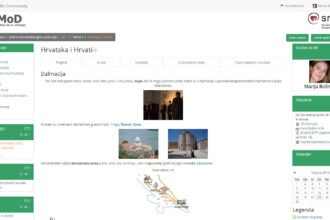Organized by the Center for Research on Croatian Diaspora, an international conference will take place on May 8 and 9, 2025, at the Croatian Heritage Foundation in Zagreb. The conference will focus on global diasporas and their relationship with the European Union, with a particular emphasis on the Croatian diaspora in a global context.
The current United Nations estimate is that there are about 281 million international migrants in the world, which equates to3.6% of the global population. But increasing numbers of people are being displaced, within and out of their country of origin, because of conflict,violence, political or economic instability as well as climate and other disasters. The number of asylulm-seekers has risen from 4.1 million in 2020 to 5.4 million in 2022 an increase of more than 30 percent.
At the end of the 20th century and the beginning of the 21st we are witnesses to enormous migration processes which led to great challenges and problems in the many countries which welcomed these migrants. Many scientists and experts that study migration issues as well as global diasporas have found that all of humanity will have to deal with these processes. The very fact that two thirds of world countries accept dual citizenship confirm that great impact of immigrants both to and from countries in the areas of economics, politics, science, culture, religion, sports and other areas.
The role of diasporas in the world has drastically changed the relationship that they had after the Second World War. Members of the various diaspora,or rather their representative organizations have become important factors in international relations. In many cases they represent cooperation between two countries, the countriy of their origin and their country of residence.In many cases they represent a bridge between the two countries.Members of the three most numerous diasporas, India of 17.5 million people, Mexicans 11.8 million people and Chinese 10.7 million play a significant role in the relations with the countries in which second generation migrants such as the USA, Canada and Australia.
On the other hand we have the case of Ireland which thanks to a political strategy implemented in the 1990’s motivated a significant repatriation of its citizens from the diaspora through instruments such as lower rates of taxation on investments not only for Irish immigrants but also for global companies which moved their operations to Ireland and resulted in both an economic and demographic boost for Ireland.
Good example of the ties between diaspora and country of origin are Israel and Croatia which in a variety of ways actively engaged and helped their maternal contries during times of war.
In the example of diasporas which originate in countries of southeastern Europe, especially the Western Balkans we can most clearly discern how migratory processes and their resulting diaspora have had a great impact on relations between their maternal countries and those in which they reside.
Based on the Ocean State Report, one thired of the population of Albania lives abroad, and 34% of citizens of Bosnia Hercegovina live outside its borders. Following the transitions of the 1990s about 2 million citizens of Romania and Bulgaria left the country of origin. In the last ten years about 400,000 citizens of Croatia , similar to the case of Kosovo left the country of origin. While in the case of Serbia 800,000 citizens have left their homeland.
The aim of this conference is to analyze the facts of the current state of affairs and through discussions present solutions which will reduce the process of immigration as well as ways in which we can impact the return of Croatian citizens who have left the country in the last twenty years.
Conference topics:
- Immigration policies in Europe
- Global and European trends with repect to migrant workers
- Demographic challenges and the potential of diasporas in the 21st century
- Integration and assimilation processes in European countries
- Does multiculturalism exist in Europe
- Brain Drain
- Monetary processes
- Electronic and mail in voting
Potential participants can add their themes which impact the Croatian diaspora to those above.
For more information, visit: Centar za istraživanje hrvatskog iseljeništva







